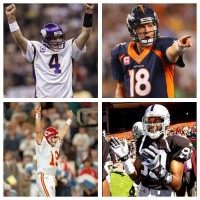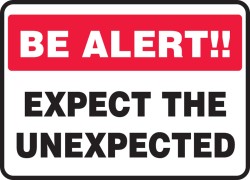In life, people are creatures of habit. We prefer routine and being comfortable. Everything from when we wake up, shower and grab a cup of coffee, to making our commute into work and listening to a radio show to provide us a mental distraction from the chaos that lies ahead.
 While the individual is always in control of their sleep, shower and coffee schedule, the same can’t be promised when it comes to listening to a radio show or working in the radio industry. That’s because the media business is faced with change on a regular basis. It’s not much different than professional sports. Remember, Brett Favre, Peyton Manning, Joe Montana and Jerry Rice all wore different jerseys at some point in their careers.
While the individual is always in control of their sleep, shower and coffee schedule, the same can’t be promised when it comes to listening to a radio show or working in the radio industry. That’s because the media business is faced with change on a regular basis. It’s not much different than professional sports. Remember, Brett Favre, Peyton Manning, Joe Montana and Jerry Rice all wore different jerseys at some point in their careers.
I raise that example because it’s one of the unavoidable situations that comes up when you work in this business. Anybody who works in programming knows that we’re in the business of generating ratings with the audience. Expectations are set, strategies are created, talent are secured and it’s all done to hopefully generate excitement with an audience and regular tune-ins each day. If all goes according to plan, the ratings will grow and advertising dollars will follow.
 But what happens when the ratings don’t grow? Or when they rise for 2-3 shows on your radio station but not for one of your other shows? That’s where the most feared word in media comes into play – “change“!
But what happens when the ratings don’t grow? Or when they rise for 2-3 shows on your radio station but not for one of your other shows? That’s where the most feared word in media comes into play – “change“!
It’s easy to say “give a show time” and that’s always been my mentality when crafting shows. I believe that most programs need 18-24 months to become consistent with an audience. In some cases I can tell much quicker that the show isn’t going to work but when I hire a show I go in with the mindset that it’ll take some time to win over the crowd.
However, just because you give something time, doesn’t mean it will reach the level that you need your brand to ascend to. If the show isn’t able to perform to the level that you’ve determined is going to be needed to justify continuing it, then at some point whether it’s easy or difficult, you’re going to have to deal with making changes.
 I’ve told some of my producers over the years that if I lose them at some point in their careers, I want to lose them to bigger career opportunities. It feels great to know you’ve worked with someone and helped them grow and as a result, another company wants to invest more in them and give them bigger responsibility. The worst part is having to cut ties with someone because they haven’t performed or delivered the necessary results.
I’ve told some of my producers over the years that if I lose them at some point in their careers, I want to lose them to bigger career opportunities. It feels great to know you’ve worked with someone and helped them grow and as a result, another company wants to invest more in them and give them bigger responsibility. The worst part is having to cut ties with someone because they haven’t performed or delivered the necessary results.
You’d be amazed at some of the situations that come up and require parting ways from people. From people stealing lunches out of the refrigerator to people showing up late and sleeping on the job to people lying and undercutting their peers to countless other stupid things that cause a person to lose respect and opportunity from an employer. While sports radio may be fun and a labor of love for many who work in it, people still are human and poor decision making happens to all of us at some point.
When it comes to on-air talent, the leash is usually longer. A lot of executives will put up with a lot of headaches if a talent is delivering ratings and revenue. Even things that are unacceptable in many other professions often get swept under the rug for someone who can be a difference maker in this industry.
Speaking for myself, before I cut bait with a host or show, chances are given and conversations are had. I’ll go through numerous things from changing the content direction of a show to changing the clock to conducting listener focus groups to asking for feedback from the host(s) about why they believe they’re not delivering ratings and what we can do better to be more successful. Once those avenues are explored, then it’s my job to promote the program and support the people doing it and it’s their job to execute and help us generate stronger audience numbers.
 While all involved may have the best of intentions, sometimes even after those discussions and adjustments, shows still don’t connect. When they don’t, nobody beats themselves up over it harder than I do. I’m sure many fellow programmers can relate. The last thing you want to do is tell somebody they have not performed to the level that’s required and as a result a change is necessary. But when you sign on to run a radio station, this is part of the job description. You can’t be a leader and have success if you’re afraid to deal with adversity and change.
While all involved may have the best of intentions, sometimes even after those discussions and adjustments, shows still don’t connect. When they don’t, nobody beats themselves up over it harder than I do. I’m sure many fellow programmers can relate. The last thing you want to do is tell somebody they have not performed to the level that’s required and as a result a change is necessary. But when you sign on to run a radio station, this is part of the job description. You can’t be a leader and have success if you’re afraid to deal with adversity and change.
When these situations occur, blame goes all the way around. The PD instantly becomes the bad guy and everyone inside and outside the building has their opinions on what’s going on. It becomes the companies fault, the ratings systems fault and everyone else’s fault and listeners will often react negatively due to the fact that a change is happening.
 You can’t as a host or programmer blame the audience and ask “why didn’t you listen more“? You can’t blame the advertisers and ask “why didn’t you spend more“? You can’t blame Nielsen and ask “why didn’t you provide more meters to people who like what we do“? You can only do one of two things, pick yourself up off the ground and find the next opportunity and make your last employer regret letting you go or sit in sorrow and blame the world for what happened.
You can’t as a host or programmer blame the audience and ask “why didn’t you listen more“? You can’t blame the advertisers and ask “why didn’t you spend more“? You can’t blame Nielsen and ask “why didn’t you provide more meters to people who like what we do“? You can only do one of two things, pick yourself up off the ground and find the next opportunity and make your last employer regret letting you go or sit in sorrow and blame the world for what happened.
I went thru this myself back in 2008. I programmed a radio station 590 The Fan in St. Louis which had a great thing going on when I arrived in 2006. The Cardinals reaching the WS that year certainly didn’t hurt business either. Over the next few months, budget cuts, employee dissatisfaction and lack of corporate support would lead the radio station down the drain and I’d become the fall guy for it because after all I was the face of the franchise.
 It was hard to accept that back then because I believed in my abilities and my desire to win but in the grand scheme of things, we were beaten before we ever hit the airwaves. I didn’t see that when I accepted the job but I did after I stepped back, removed my emotion from the situation and figured out how I’d learn from it going forward.
It was hard to accept that back then because I believed in my abilities and my desire to win but in the grand scheme of things, we were beaten before we ever hit the airwaves. I didn’t see that when I accepted the job but I did after I stepped back, removed my emotion from the situation and figured out how I’d learn from it going forward.
When I received my next opportunity as programmer of 101 ESPN in St. Louis, I made sure I knew I’d have better corporate support and a General Manager who believed in me and the confidence that was instilled in me allowed me to focus on what I do best and fortunately thanks to hiring a lot of smart and talented people and supporting them, the station became a smashing success. The product became #1 for sports radio listening in the market and reached a level of being the 2nd highest rated sports station in the country during one particular month in 2010.
Today I sit in San Francisco where I program 95.7 The Game. In this market, my brand is the underdog taking on a heritage sports radio brand that has the Giants, 49ers and Warriors games on their air and they’ve rode the success of play-by-play to the top spot in the market for well over 20 years. When we built this station, we didn’t launch with the expectation that we’d beat our competitor in the ratings in the first couple of years. We launched with the mindset of hiring dynamic talent and building a strong and viable brand that in time could work it’s way up towards the top.
 Setting realistic expectations is important because you don’t overtake strong brands in 1-2 years just because you’ve arrived and presented talent and a vision that you believe is superior than the competitor. If it was that easy and that formula worked that fast, I’d have already retired. You have to have a strong strategy, know where opportunities lie in the market, create a plan that will consistently show growth and establish what makes you unique to the market. When you go from 25th to as high as 6th in the span of 3 years, that’s a sign that you’re on the right track.
Setting realistic expectations is important because you don’t overtake strong brands in 1-2 years just because you’ve arrived and presented talent and a vision that you believe is superior than the competitor. If it was that easy and that formula worked that fast, I’d have already retired. You have to have a strong strategy, know where opportunities lie in the market, create a plan that will consistently show growth and establish what makes you unique to the market. When you go from 25th to as high as 6th in the span of 3 years, that’s a sign that you’re on the right track.
Since I’ve been here, we’ve shown that we will not be afraid to introduce new talent, take risks and change course if things aren’t working. One thing I always enjoy is hearing our current listeners criticize or compliment the work previously done by Brandon Tierney, Eric Davis, Sean O’Connell, Ric Bucher, Aubrey Huff and The Rise Guys. A few years ago these were foreign names to Bay Area sports radio fans and had we not taken a chance to put them on the air and introduce them, people would not have had opinions of them. Clearly they all had tremendous talent and whether the feedback on them was good or bad, it showed that new voices with strong talent, can connect in a market like San Francisco.
While one could play devil’s advocate and criticize us for not being consistent, the fact of the matter is that when you’re in the driver’s seat in a market, it’s your job to keep a winning product consistent and lock up the things that are most important to your success until you’re forced to adapt. In our case, we’ve got to keep growing to eventually cause bigger disruptions and change long-term listening habits. If that requires adjusting as we go, then that’s what we’ll do. During the past 9 months our radio station has had its highest ratings run and had we not made changes I’m not sure if that would be the case. That can certainly be debated but in a business that is judged by results, the numbers don’t lie.
 Change is never easy for people but it’s a part of life (especially the media business) and I often find that I work best when I’ve got my back up against the wall. I think that you learn a lot about people in this business when the pressure is on and decision making is critical. It’s in most people’s nature to try and find a way to return to a place of comfort rather than enter foreign territory but sometimes you’ve got to be willing to gamble and put your ass on the line in order to create bigger opportunities for your brand.
Change is never easy for people but it’s a part of life (especially the media business) and I often find that I work best when I’ve got my back up against the wall. I think that you learn a lot about people in this business when the pressure is on and decision making is critical. It’s in most people’s nature to try and find a way to return to a place of comfort rather than enter foreign territory but sometimes you’ve got to be willing to gamble and put your ass on the line in order to create bigger opportunities for your brand.
When I look across the sports radio landscape, I see tons of stations who have not been afraid to take risks and as a result, have been rewarded for it. From The Score in Chicago to 710 ESPN in Seattle to 680 The Fan in Atlanta to Arizona Sports 98.7 FM in Phoenix. All made changes and continue to perform strongly. The same can be said for 101 ESPN in St. Louis, The Fan in Dallas, WEEI in Boston and The Fanatic in Philadelphia. All of these stations have continued to thrive despite dealing with change and there are plenty of others who could easily be on this list.
 Look at sports television and you’ll see the same. Over the past 5-10 years Monday Night Football switched from a 3-man booth to 2-man booth, First Take went from rotating hosts to using Stephen A. & Skip, Jerry Rice, Emmitt Smith and Michael Irvin left ESPN while Chris Carter, Keyshawn Johnson and Ray Lewis signed on and Football Night in America lost Tiki Barber, Jerome Bettis and John Madden but added Hines Ward, Tony Dungy, Rodney Harrison and Chris Collinsworth.
Look at sports television and you’ll see the same. Over the past 5-10 years Monday Night Football switched from a 3-man booth to 2-man booth, First Take went from rotating hosts to using Stephen A. & Skip, Jerry Rice, Emmitt Smith and Michael Irvin left ESPN while Chris Carter, Keyshawn Johnson and Ray Lewis signed on and Football Night in America lost Tiki Barber, Jerome Bettis and John Madden but added Hines Ward, Tony Dungy, Rodney Harrison and Chris Collinsworth.
Some may see making changes as showing a lack of consistency and that’s fair, but some also believe it’s necessary to stay ahead of the curve. From where I sit, I’d much rather take risk and fail trying to be great than stay complacent and wait to be picked off. It certainly seemed to work out ok for Favre, Manning, Rice and Montana!

Jason Barrett is the Founder and CEO of Barrett Media. The company launched in September 2015 and has provided consulting services to America’s top audio and video brands, while simultaneously covering the media industry at BarrettMedia.com, becoming a daily destination for media professionals. Prior to Barrett Media, Jason built and programmed 95.7 The Game in San Francisco, and 101 ESPN in St. Louis. He was also the first sports programmer for SportsTalk 950 in Philadelphia, which later became 97.5 The Fanatic. Barrett also led 590 The Fan KFNS in St. Louis, and ESPN 1340/1390 in Poughkeepsie, NY, and worked on-air and behind the scenes at 101.5 WPDH, WTBQ 1110AM, and WPYX 106.5. He also spent two years at ESPN Radio in Bristol, CT producing ‘The Dan Patrick Show’ and ‘GameNight’. JB can be reached on Twitter @SportsRadioPD or by email at Jason@BarrettMedia.com.




